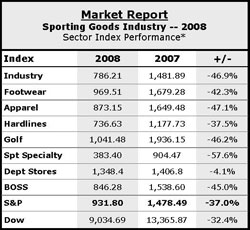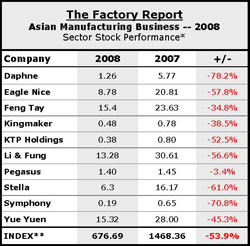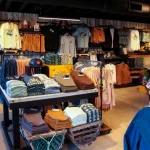The Deals of the Year, 2008
Though lacking any of the major blockbuster deals like adidas/Reebok or even Quiksilver/Rossignol that seemed to fuel speculation in years past, 2008 did see a healthy amount of M&A activity as companies looked to achieve better profitability through economies of scale or through a more vertically-oriented business model.
One of the segments most active in the M&A world was the hockey market. Most industry watchers expect the consolidation to continue here, but 2008 definitely saw two of the largest moves. The shake-up started as Nike sold its Bauer Hockey business in late February to an investor group led by Kohlberg & Company and Canadian businessman W. Graeme Roustan in a deal valued at $200 million. Once operations were running smoothly under the new ownership, Bauer Hockey turned its eyes to the acquisition arena, picking up Mission/ITECH Hockey in late September.
Billabong Builds Action Empire
Off the ice, the action sports industry also saw a healthy amount of consolidation, led by one major brand on an empire building spree. However, the biggest M&A story to come out of the segment dealt with getting out from under a bad decision made in 2005: Quiksilver selling off Rossignol.

Though Quik paid an estimated $288 million in 2005, it ended up selling Rossignol for approximately $142.6 million in late August. Quik ended up selling Rossi to Chartreuse & Mont Blanc (C&MB), a company formed by former Rossignol CEO Bruno Cercley and backed by Jarden Corp., owner of the K2 ski brand. The transaction included the sale of the Rossignol, Dynastar, Look and Lange brands of winter sports equipment and apparel.
In more success action sports M&A moves, Billabong continued to expand its empire, on both the vendor and retailer sides of the equation. In June, the company acquired Quiet Flight, an operator of 13 stores on the east coast of the U.S. including Billabongs own flagship store in NYC. That deal added approximately 3% to Billabongs sales revenues for 2008.
Just a few short weeks later, Billabong moved into the skate longboard market, acquiring Sector 9. That deal was expected to add approximately 2% to Billabong revenues. Finally, in August, Billabong reached an agreement to acquire DaKine Hawaii Inc., best known for its high-tech backpacks. The final purchase price could total as much as $133 million, with Billabong initially paying $99.9 million in cash. The final amount may also include up to $33.3 million in bonus payments paid in 2012, subject to the future performance of the business and certain management retention conditions.

And Foot Locker Expands its Teen Reach…
Volcom started the year out with an acquisition, picking up currently hot sunglass brand Electric for $25.25 million up front, with an additional $21 million possible through a 3-year earn-out based on EBITDA. For 2007, Electric revenue was $23.5 million, with VLCM saying in the presentation that they expected approximately 20% growth in 2008. The deal was expected to be EPS-neutral for 2008. Volcom, like Billabong, also stepped into the retail world with the acquisition of Laguna Surf & Sport, though on a much smaller and closer to home basis. A core surf and skate retailer, LS&S operates two stores in Southern California, in Laguna Beach and Aliso Viejo. The acquisition was expected to add approximately $900,000 to full year revenues for VLCM with management describing the transaction as an opportunistic acquisition that mirrored similar moves by the likes of Billabong and Quiksilver.

Perhaps the largest deal in the action sports industry, though, involved an outsider taking over one of the longest standing catalog businesses in the market as Foot Locker acquired CCS from Delia*s, closing the transaction in November. Foot Locker, Inc. paid $102 million in cash to acquire the business. With CCS revenues expected to exceed $80 million in 2009, Foot Locker, Inc. expects the deal to be accretive to FL earnings in its first full year of operation. This deal will likely matter more in opening doors and conversations with core industry brands for Foot Locker than it will in picking up a successful catalog operation.
The golf industry saw a handful of deals go down as Dicks Sporting Goods started the year acquiring the Maxfli trademarks from TaylorMade-adidas Golf. The retailer added Maxfli to the host of brands including Slazenger that it already exclusively offered through its private brands strategy. TMaG itself made an acquisition late in the year as it picked up the struggling operations of apparel company Ashworth. Cleveland Golf sold off its apparel operations, FIDRA, which itself was founded by John Ashworth, shortly after Cleveland was acquired from Quiksilver by Srixon.
In the outdoor specialty world, Dorel expanded its Pacific Cycle division to more actively pursue the IBD channel when it acquired Cannondale and its subsidiary Sugoi. Dorel Industries paid Pegasus Capital Advisors between $190 million and $200 million to acquire Cannondale Bicycle Corp. after which it formed the Cannondale Sports Group, which include the Cannondale and Sugoi brands as well as GT.
Also in the bike end of the outdoor segment, Shimano Inc., the Japanese cycling and fishing gear maker, reached an agreement to buy Pearl Izumi for $69.5 million in cash. Nautilus had initially put the cycling and running brand on the selling block in October 2007. Nautilus acquired Pearl Izumi in July 2005 for approximately $68 million in cash and about $6 million in assumed debt.
In apparel, Beaver Theodosakis and his co-founders took back prAna from Liz Claiborne with help from PE firm Steelpoint Capital Partners in a management led leveraged buyout. prAna was acquired by Liz Claiborne for $34.4 million in November 2005 as a first step toward building a coalition of young lifestyle brands that would span the outdoors, surf and boarding cultures. But just five months after the deal, Liz appointed a new CEO who promptly ordered a review of 16 of the company's 36 brands in the wake of declining department store sales. After seven months of due diligence with ten bidders, Liz announced it had sold the company back to its co-founders for $40.5 million. Under an earnings payout formula that was part of the 2005 deal, Liz had to pay the founders $18.4 million.
And Founders Re-Acquire Their Businesses…
In the outdoor specialty retail space, Nitches acquired Midwest retailer Backwoods Equipment Company. However, in October, Backwoods CEO, Jennifer Mull, re-acquired the business back from Nitches. Nitches itself now appears to be in some trouble facing a possibly de-listing from the NASDAQ exchange.
Also in outdoor specialty retail, lifestyle apparel maker Horny Toad acquired the Nau outdoor brand in August, including its trademark, URL, and all intellectual property such as product designs. In addition, the company acquired the physical assets of Naus design offices for an undisclosed sum. In early May, Nau announced it was winding down operations because it could not raise more money after burning through $34 million in cash in its first year. The high-profile start-up used the funds to launch a sustainable clothing line and sell it directly to consumers through its own website and stores, but that business plan ultimately failed to generate enough returns at a quick enough rate to keep the ambitious project afloat.
At retail in general, the deal market was somewhat slower, especially after the Finish Line/Genesco merger failed in such a loud fashion. The TJX Companies Inc. sold Bob's Stores to a pair of private equity firms, Philadelphia-based Versa Capital Management and Boston-based Crystal Capital. Financial terms were not revealed, but TJX said the sale would generate $23 million in cash proceeds, primarily from tax benefits. TJX bought the bankrupt Bobs Stores for about $57 million in December 2003. The chains sales improved during the past two years, but it never managed to turn a profit. Last year, Bob's Stores, which has 34 stores in the northeast, had an operating loss of $17.4 million on sales of approximately $310 million.
Near the end of the year, Canadian Co-op, UFA Co-operative Limited said it signed a Memo of Understanding under which, subject to completion of negotiations and due diligence, it will acquire a majority interest in Sportsmans Warehouse. As part of the deal, UFA injected an undisclosed sum of capital into the retailer to help it restock its shelves in time for the holiday season. Utah-based Sportsmans Warehouse operated 67 stores in 38 states at the time of the deal and generated annual sales of approximately $800 million.
Finally, Gap, Inc. acquired Athleta, Inc., the womens sports and active apparel catalog company, for approximately $150 million in cash. The acquisition is expected to help Gap break into the $31 billion womens active apparel sector in the U.S., which drew attention in 2008 thanks to the stellar performance of lululemon athletica. The deal marked the first acquisition for Gap since the company bought Banana Republic in 1984.














